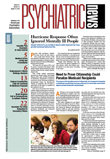The Senate Appropriations Committee approved a draft Fiscal 2007 Labor-HHS-Education spending bill in late July that raised the possibility that Congress may approve the primary mental health spending measure before the next fiscal year begins.
The bill (S 3708) would provide $142.8 billion in health-related discretionary spending, which is $5 billion more than President Bush requested and $1.3 billion more than the Fiscal 2006 amount. The House version (HR 5647) would provide $141.9 billion for discretionary programs. The rest of the funding in both health budget bills is allocated for Medicare, Medicaid, and other entitlement programs.
“While [the Senate's funding level] amounts to a modest dollar increase in health spending, it is still higher than the House's version,” said Nicholas Meyers, director of APA's Department of Government Relations.
The Senate bill would provide $28.5 billion for the National Institutes of Health (NIH), an increase of $220 million over Fiscal 2006 and $200 million over the president's budget request.
The House version, which also provides $28.5 billion for NIH, has been approved by that chamber's Appropriations Committee.
Congressional negotiators will reconcile differences in the two versions after both chambers pass their versions of the bill.
Rep. David obey (D-Wis.) criticized the proposed budget for NIH as insufficient, given a “substantial” inflation in research costs. Sen. Arlen Specter (R-Pa.) said that even in the more-generous Senate version, NIH funding is $3.78 billion below the inflation-adjusted Fiscal 2006 level.
For the three mental health institutes within NIH, the Senate measure would provide $1.4 billion to the National Institute of Mental Health (NIMH), $1 billion to the National Institute on Drug Abuse, and $436 million to the National Institute on Alcohol Abuse and alcoholism. These amounts are similar to the current year's funding levels for the three institutes.
The Senate bill would provide $3.34 billion for the Substance Abuse and Mental Health Services Administration (SAMHSA), an increase of $77 million over the president's budget request. SAMHSA is responsible for supporting mental health programs and alcohol and other drug abuse prevention and treatment services.
The Senate bill would restore the $630 million for SAMHSA's Community Services Block Grant, which was proposed for elimination in the president's budget.
Proposed Budgets for VA
The Senate Appropriations Subcommittee on Military Construction, Veterans Affairs, and Related Agencies approved a $94.3 billion Fiscal 2007 Military Construction-VA appropriations bill (HR 5385). Of that amount, $77.9 billion is earmarked for the Department of Veterans Affairs, which includes health care spending for veterans. The bill, however, does not include a proposal from the president to increase TRICARE fees for some veterans. President Bush had requested an increase in premiums for some veterans and their families in TRICARE, the program that funds health care for this population, as well as higher enrollment fees, deductibles, and prescription drug copayments for some military retirees. The House bill, which would allocate $36.5 billion for VA discretionary programs, also does not include the proposal.
Both the House and Senate bills would provide $32.7 billion for the Veterans Health Administration and $3.6 billion for VA medical facilities.
The House's allocation for the overall VA spending bill is $136.1 billion. It is dramatically higher than the Senate's $94.3 billion total because the House bill would fund some defense accounts that the Senate bill would not, including the Defense Health Program. Following Senate passage, negotiators will have to hammer out differences between the House and Senate versions of the bill.
Family Treatment Addressed
In addition to its work on a health care funding bill, the Senate passed legislation concerning children who are placed in the child welfare system because they are affected by methamphetamine use. The Improving Outcomes for Children Affected by Methamphetamine Act of 2006 (S 3525) amends the Promoting Safe and Stable Families program to reserve $40 million for grants to create regional partnerships to improve outcomes for children affected by methamphetamine abuse or addiction. This bill was sponsored by Sen. Charles Grassley (R-Iowa), and the president is expected to sign the measure.
“By emphasizing comprehensive family treatment, we are promoting a promising strategy for families to recover from meth addiction together,” Grassley said at a hearing on the bill.
